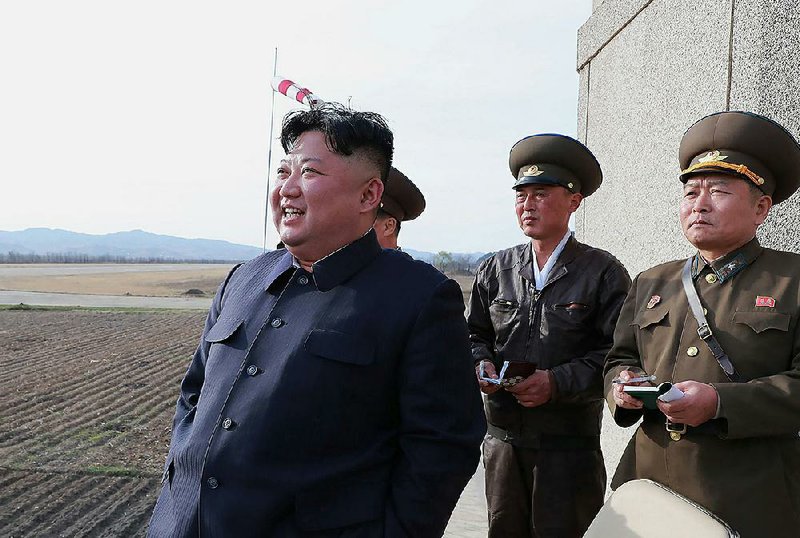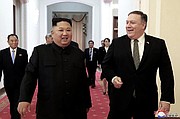TOKYO -- North Korea spurned the top U.S. diplomat as not sufficiently "mature" and offered a hand to Moscow on Thursday in back-to-back moves by Kim Jong Un to possibly reset the terms of his outreach with Washington.
The announcements came hours after North Korea announced that it had tested a tactical guided weapon, its first public weapons test since the breakdown of a summit between President Donald Trump and Kim in February.
North Korea further jabbed Washington by announcing it no longer wants to talk to Secretary of State Mike Pompeo in negotiations over Pyongyang's nuclear program. The statement, carried by state media outlets, demanded that Pompeo be replaced with someone who "is more careful and mature in communicating."
Then, in Moscow, the Kremlin announced that Kim plans to meet President Vladimir Putin in Russia later this month. For Kim, the planned summit is an opportunity to expand his options and potential leverage with the United States and China, the North's longtime ally.
Taken all together, the steps by Kim suggest a push toward bolder initiatives by the North with U.S. talks stalled after the collapse of the Hanoi, Vietnam, summit. But it does not appear to signal that Kim wants to break off the dialogue, experts said.
"Kim Jong Un does not intend to walk out of negotiations but shows that he can 'seek a new way' in the worst case," said Lee Jong-Seok, a former South Korean unification minister who is now at the Sejong Institute.
The apparent snub of Pompeo also could force a revised approach from Trump.
Pompeo's main offense, in the North Koreans' eyes, seems to be when he referred to Kim as a "tyrant" during a Senate hearing.
Nevertheless, the North Korean regime is clearly frustrated with denuclearization talks, analysts say, and by what it sees as unreasonable American demands to fully dismantle nuclear facilities before receiving relief from international economic sanctions.
A statement quoting senior North Korean official Kwon Jong Gun, reported by the Korean Central News Agency and picked up by Reuters, said that whenever Pompeo "pokes his nose in, talks between the two countries go wrong without any results even from the point close to success."
"I am afraid that, if Pompeo engages in the talks again, the table will be lousy once again and the talks will become entangled," he told the Korean news agency. "Therefore, even in the case of possible resumption of the dialogue with the U.S., I wish our dialogue counterpart would be not Pompeo but a person who is more careful and mature in communicating with us."
Kwon added that Kim remains "on good terms as usual" with Trump, comments that signal the regime wants to open up wedges in the administration between the president and his advisers, including Pompeo and national security adviser John Bolton. Pyongyang has portrayed the pair as pushing for its complete disarmament before dispensing economic rewards, which it sees as a nonstarter for negotiations.
Kim has escalated his rhetoric since the Hanoi summit, urging top ruling party members last week to deal a "severe blow to hostile foreign forces" by resisting sanctions. He also gave the U.S. a year-end deadline to make it an offer it liked.
After Kim issued the deadline, Pompeo said at an event in Texas this week that the North Korean leader promised Trump to denuclearize and "our teams are working with the North Koreans to plot a -- to chart a path forward so that we can get there. He said he wanted it done by the end of the year. I'd love to see that done sooner."
North Korea's Kwon said Pompeo was "talking nonsense" in suggesting that working-level negotiation between the countries would be finished by year's end. The speech, he added, only suggested "the U.S. should change its way of calculation and come up with responsive measures before the end of this year."
This is not the first time Pompeo has felt the heat of North Korean ire. He was accused of making "gangsterlike demands" in July, shortly after a visit to Pyongyang.
MEETING IN APRIL
At the same time, North Korea is making long-anticipated overtures to Putin.
A short statement by the Kremlin said that Putin invited Kim and that the North Korean leader will meet with him in the second half of April. No date was announced.
Russian news reports suggest the meeting will take place in Vladivostok, on Russia's Pacific coast, as Putin heads to a summit in Beijing.
The planned summit gives Putin another stage to project Russian influence. The Kremlin has tried for months to secure a meeting with Kim, while simultaneously ramping up diplomatic engagement with North Korea.
Moscow maintained close ties with Pyongyang during the Soviet era, building dozens of factories and key infrastructure, sending supplies and providing weapons for the North Korean military. Those ties withered after the 1991 Soviet collapse, when Moscow cold-shouldered former Soviet allies during the nation's economic meltdown.
Shortly after his first election, Putin sought to reinvigorate ties with North Korea, visiting Pyongyang in July 2000 on the way to a summit of the Group of Eight leading industrialized nations in Okinawa. Putin then boasted about securing a promise from then-leader Kim Jong Il to abandon North Korea's missile program in exchange for foreign help in launching satellites, but he suffered a setback when Kim Jong Il quickly disavowed his statement.
Despite the gaffe, Putin continued courting the North Korean leader, who crossed Russia by train to visit Moscow in 2001. He again visited regions in Russia's far east the next year, and made another trip across the border in 2011.
While Russian-North Korean military cooperation was stopped by the United Nations sanctions, Moscow supplied grain and provided humanitarian aid to the North, and tens of thousands of North Korean migrant laborers have worked in Russia's underpopulated Far East.
Russian outreach ramped up in May 2018 with the visit of Foreign Minister Sergei Lavrov to Pyongyang in the first high-level visit by a Russian official to North Korea since 2009.
Over the past month, the Russian parliament has sent two delegations and Russian diplomats have been in daily consultations with North Korean officials.
"Russia can have some say in Pyongyang, but only if it is going to pay," said Andrei Lankov, a Russian North Korea expert at Seoul's Kookmin University. "Your willingness to pay does not guarantee you will be taken seriously in Pyongyang, but if you don't pay, you are never taken seriously."
Lankov said Putin was unlikely to offer Kim a major aid package, simply because Russia has more pressing priorities in Central Asia and eastern Europe. As Lankov put it: Kim knew it wasn't worth his time and effort until now.
In the meantime, Kim is likely to be looking to China and Russia for diplomatic support and covert sanctions relief.
Kim also may have been disappointed that South Korean President Moon Jae-in didn't secure sanctions relief for North Korea when he visited Trump last week in Washington, experts said.
"Kim needs Putin as leverage with Trump to show him that his ultimate pressure approach is a dud," said Vladimir Frolov, a Russian foreign-policy analyst.
"But Putin can't give Kim what he wants most -- United Nations Security Council sanctions relief, which the U.S. will veto," he added.
Hours before Russia's announcement, the Korean Central News Agency reported that Kim oversaw testing of an unspecified weapon. Kim was reported to have said "the development of the weapon system serves as an event of very weighty significance in increasing the combat power of the People's Army."
It was not immediately clear what type of weapon the North Koreans fired in the test. Arms experts said the description of a tactical weapon -- with guided flight, capable of carrying a powerful warhead and fired at a variety of targets -- suggested a short-range missile rather a longer-range missile. That would mean the move would not violate North Korea's self-declared moratorium on testing.
Trump said last month that he "would be very disappointed if I saw testing." There have been fresh reports of new activity at a North Korean missile research center and long-range rocket site where the North is believed to build missiles to target the U.S. mainland.
Harry Kazianis, director of Korean studies at the Center for the National Interest, said Kim was sending a signal with the weapons test.
"Kim is trying to make a statement to the Trump administration that his military potential is growing by the day, and that his regime is becoming frustrated with Washington's lack of flexibility in recent negotiations," he said.
Information for this article was contributed by Simon Denyer and Matthew Bodner of The Washington Post; by Seyoon Kim of Bloomberg News; and by Vladimir Isachenkov, Foster Klug, Kim Tong-Hyung, Hyung-jin Kim, Lolita C. Baldor and Matthew Lee of The Associated Press.
A Section on 04/19/2019


